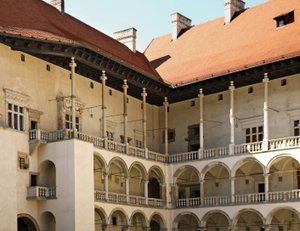
25 stycznia o godz. 16.00 odbędzie się międzynarodowe seminarium poświęcone literaturze filozoficznej Rzeczypospolitej Obojga Narodów, organizowane przez Fédération Internationale des Sociétés et Instituts pour l'Étude de la Renaissance, Pracownię Literaturę Renesansu, Wydział Polonistyki UJ oraz czasopismo "Terminus".
Seminarium odbędzie się w wersji hybrydowej, stacjonarnie Kraków, ul. Gołębia 16, sala 42 oraz na platformie Zoom (obowiązuje rejestracja na wydarzenie do 19 stycznia; link do rejestracji: TUTAJ).
W programie referaty prof. Steffena Hubera i dr Barbary Kaszowskiej-Wandor, po których nastąpi debata z udziałem prof. Doroty Pietrzyk-Reeves, prof. Gabora Gango i prof. Tomasa Niejeschleby.
Szczegółowy program:
12th session of FISIER's online international seminar ReNoV / ReNeW on the subject:
The philosophical literature of the Polish-Lithuanian Commonwealth
in the Early Modern period
Thursday, January 25, 2024, 16h-19h (Warsaw time)
Kraków, ul. Gołębia 16, room 42 and online after registration before 19 January: Registration Link
Speakers:
STEFFEN HUBER (Jagiellonian University in Krakow) The Professor and Head of the Department of Polish Philosophy at the Institute of Philosophy, Jagiellonian University in Krakow; the principal investigator in the project “Polonica Philosophica Orientalia” (NPRH grant). Main interests: Polish and East European philosophy of the Early Modern period, especially political thought and metaphysics.
The rule of law in the philosophical discourse of the Polish-Lithuanian Commonwealth after 1569
Abstract: In the first part of my paper, I will give an overview of political philosophy in the Renaissance period. The Commonwealth and its components, i.e. the Kingdom of Poland, the Grand Duchy of Lithuania, the Kozak state and various other communities, viewed themselves as republics. The pivotal aspect of this republican model was the idea that the law stood above everyone, including the monarch (in Polonia lex est rex). Thus, the republic was monarchic, and the monarchy was republican. Such philosophers as Andreas Fricius Modrevius, Laurentius Goslicius, Andreas Volanus, August Rotundus and Aaron Alexander Olizarovius wrote comprehensive works on this specific construction. In the second part, the Polish-Lithuanian model of the rule of law appears as a juridical project based on contract theory in the works of Paulus Vladimiri, Petrus Roisius and Sigismund Lauxmin. Finally, in the third part, I will refer to sources presently being prepared for the edition: lectures on politics held at the University of Vilnius around 1690. I will argue that the regionally specific model of the Renaissance republic lasted even until 1720. Accordingly, I will close with remarks on the chronology
of Renaissance and Modernity in the region of the Polish-Lithuanian Commonwealth. The paper will include a short presentation of the joint Polish, Lithuanian, Belarusian and Ukrainian research project “Polonica Philosophica Orientalia” (2018-2024) which has made a part of the textual sources accessible.
BARBARA KASZOWSKA-WANDOR (Jagiellonian University in Krakow) PhD, a member of the Department of the History of Old Polish Literature, an editor of “Wielogłos” (Polylogue), a journal published at the Faculty of Polish Studies. Research interests: the philosophy of literature, with emphasis on the transformations of humanistic anthropology and the philosophy of culture, posthumanism, and changing concepts of commonality.
Early modern protreptic discourse in the Polish-Lithuanian Commonwealth
Abstract: The paper focuses on the relationship between literary modes of expression and philosophical persuasion in multilingual, multicultural and multiconfessional writings of the early modern Polish-Lithuanian Commonwealth. It departs from the conventional approach, which aims to identify the philosophical sources of literary texts. Instead, it examines the specific rhetorical literary forms, developed as the new media of philosophical argumentation and for a long time treated as the margins of both: philosophy (also theology) and literature. In this context, I apply the broad concept of protreptic discourse, which has gained popularity in new academic research. As I argue, the dialogical and agonistic potential of protreptic tradition is creatively negotiated in 16th-century literature of the Commonwealth.
Respondents: DOROTA PIETRZYK-REEVES (Jagiellonian University in Krakow) Professor of political philosophy at the Jagiellonian University. She has published widely on the history of political ideas, political theory and early modern republicanism. Her most recent book is Polish Sixteenth Century Republican Discourse (Cambridge University Press, 2020). GÁBOR GÁNGÓ (Max-Weber-Kolleg Universität Erfurt) Associated Fellow at the Max Weber Centre for Advanced Cultural and Social Studies at the University of Erfurt, historian of philosophy and intellectual historian with a research focus on Leibniz, Johann Christian von Boineburg, and early modern natural law. TOMÁŠ NEJESCHLEBA (Palacký University Olomouc) Professor at the Department of Philosophy at Palacký University in Olomouc. He lectures on the history of medieval and Renaissance philosophy and specializes in the reception of Renaissance philosophy in the Czech lands from the 15th to the 17th century.
